最新整理济慈名诗夜莺颂中英对照欣赏
济慈名诗夜莺颂中英对照欣赏(2)

济慈名诗夜莺颂中英对照欣赏(2)济慈诗歌欣赏带翻译篇三TO AUTUMN 秋颂by John Keats(查良铮译)SEASON of mists and mellow fruitfulness,Close bosom-friend of the maturing sun;Conspiring with him how to load and blessWith fruit the vines that round the thatch-eves run;To bend with apples the moss’d cottage-trees,And fill all fruit with ripeness to the core;To swell the gourd, and plump the hazel shellsWith a sweet kernel; to set budding more,And still more, later flowers for the bees,Until they think warm days will never cease,For Summer has o’er-brimm’d their clammy cells.雾气洋溢、果实圆熟的秋,你和成熟的太阳成为友伴;你们密谋用累累的珠球,缀满茅屋檐下的葡萄藤蔓;使屋前的老树背负着苹果,让熟味透进果实的心中,使葫芦胀大,鼓起了榛子壳,好塞进甜核;又为了蜜蜂一次一次开放过迟的花朵,使它们以为日子将永远暖和,因为夏季早填满它们的粘巢。
Who hasth not seen thee oft amid thy store?Sometimes whoever seeks abroad may findThee sitting careless on a granary floor,Thy hair soft-lifted by the winnowing wind;Or on a half-reap’d furrow sound asleep. Drowsed with the fumes of poppies, while thy hook Spares the next swath and all its twined flowers: And sometimes like a gleaner thou dost keep Steady thy laden head across a brook;Or by a cyder-press, with patient look,Thou watchest the last oozings hours by hours.谁不经常看见你伴着谷仓?在田野里也可以把你找到,弥有时随意坐在打麦场上,让发丝随着簸谷的风轻飘;有时候,为罂粟花香所沉迷,你倒卧在收割一半的田垄,让镰刀歇在下一畦的花旁;或者.像拾穗人越过小溪,你昂首背着谷袋,投下倒影,或者就在榨果架下坐几点钟,你耐心地瞧着徐徐滴下的酒浆。
ode to a nightingale中英对照
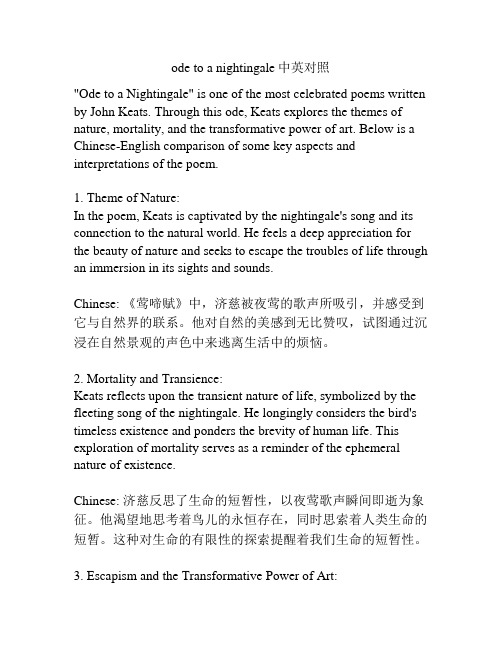
ode to a nightingale中英对照"Ode to a Nightingale" is one of the most celebrated poems written by John Keats. Through this ode, Keats explores the themes of nature, mortality, and the transformative power of art. Below is a Chinese-English comparison of some key aspects and interpretations of the poem.1. Theme of Nature:In the poem, Keats is captivated by the nightingale's song and its connection to the natural world. He feels a deep appreciation for the beauty of nature and seeks to escape the troubles of life through an immersion in its sights and sounds.Chinese: 《莺啼赋》中,济慈被夜莺的歌声所吸引,并感受到它与自然界的联系。
他对自然的美感到无比赞叹,试图通过沉浸在自然景观的声色中来逃离生活中的烦恼。
2. Mortality and Transience:Keats reflects upon the transient nature of life, symbolized by the fleeting song of the nightingale. He longingly considers the bird's timeless existence and ponders the brevity of human life. This exploration of mortality serves as a reminder of the ephemeral nature of existence.Chinese: 济慈反思了生命的短暂性,以夜莺歌声瞬间即逝为象征。
英国诗人济慈的经典诗歌《夜莺颂》原文及赏析

英国诗人济慈的经典诗歌《夜莺颂》原文及赏析夜莺颂第一节我的心疼痛,我感到昏昏欲睡,麻木不仁,好像是饮过毒鸩,又像是刚刚吞服过鸦片,开始沉向冥府的忘川。
这并非我对你的福气有所妒嫉,而是你的欢乐使我过度欣喜——你呀,羽翼翩翩的树精,在山毛榉的绿叶与荫影之中,在那歌声悠扬的地点,你舒展了喉咙,歌唱着夏天。
夜莺颂第二节啊,但愿有一口美酒,一口曾在地窖冷藏多年的美酒!人一尝就会想到花神,想到葱绿的酒乡,想起舞蹈、恋歌和丰收季节的欢狂。
啊,要是那杯酒带有南国的热气,红如人面,充满灵感之泉的真味,珍珠的泡沫在杯沿浮动,能把嘴唇染得绯红,我就会一饮而尽,悄然离开尘寰,随你隐没在幽暗的林间。
夜莺颂第三节远远地隐没,消失,并且忘记你在林间从不知晓的东西,忘记这里的厌倦、焦虑和烦躁不安。
这里,人们坐在一起长吁短叹;这里,老年瘫痪了,只剩得几根白发摇晃,青年也变得苍白,瘦削,以至死亡;这里,人们一思想就感到伤悲,就会绝望得两眼铅灰;这里,美人的双眸难以保持明丽,新生的爱情第二天就会凋敝。
夜莺颂第四节飞去,飞去,我要向你飞去,不是与酒神同驾豹车而去,而是乘坐诗神的无形的双翼,尽管这头脑恁地迟钝、团惑和呆滞。
啊,此刻我终于和你在一起了;夜,是这般地柔和,也许月后已经登上宝座,众星正在四周守望,但是,这里却没有光亮,除了几丝天光,随风穿过窗枝的隙缝,穿过绿叶的荫影和苔藓的曲径。
夜莺颂第五节我看不清什么花儿在我脚下,也望不见什么花儿在枝头挂,但是,在温馨的黑夜,我却能猜想这个季节的每一种芬芳,那就该有香草、灌木和野果树的花。
有山楂和野玫瑰的花,还有早谢的紫罗兰为绿叶遮盖,还有麝香蔷薇即将盛开——那种蔷薇是五月中旬的骄儿,流露着酒香,它是夏夜蚊蝇飞鸣的地方。
夜莺颂第六节我在黑暗中倾听你的歌声,我多次想到死亡,他可以给人安宁。
我在诗歌里亲昵地向他呼唤,求他把我的生命化为青烟。
现在我越发感到死亡的富丽,想在午夜安然地与世别离,但此刻你却以如此的狂喜倾吐着你的胸臆,你将永远歌唱不息,我死了就不会再听见你——你将唱给一堆草泥。
梦幻的心灵之歌--《夜莺颂》赏析

2梦幻的心灵之歌——《夜莺颂》赏析周倩兰州大学文学院《夜莺颂》写于1819年的5月,一个春末夏初、阳光明媚的早晨,彼时的济慈,深受贫寒窘迫生活的困扰,经历与至亲生离死别的悲痛,自身也因罹患绝症遭受死亡的威胁,虽然正值风华正茂的年纪,正当沉浸于爱河的甜蜜岁月,他美好的生命却正如烂漫春光一般脆弱而易逝。
此时他憩于树下,听到了夜莺的鸣音,婉转而空灵的歌声,带领他超越了凡世,脱胎于病躯,摒弃俗尘的烦扰,游离于世外,开始一段从现实到梦幻,最终又从梦幻回归到现实的心灵之旅。
第一节开头,济慈写到“我的心疼痛”,似饮毒鸩,似吞鸦片,“开始沉向冥府的忘川”。
他似在寻求一种解脱,哪怕是借助使人死亡的hemlock,令人麻醉的opiate,还是让人忘却一切的Lethe,即便这些最终导致的结果,只能是趋向空无一物的虚无。
诗歌开篇,诗人就抛出了他所思索之问,即死亡与永恒之间的对立,或许只有死亡方能造就永恒。
夜莺的欢乐让“我过度欣喜”,极致的美好与极乐相伴,而极乐所导向的,是生的尽头,抑或是生的重生?诗人沉向欢乐与遗忘的深渊,以一个干净的灵魂的姿态,去聆听“Dryad林中仙女”夜莺对夏天,对未来,对一切美好的歌唱。
“啊,但愿有一口美酒,一口曾在地窖冷藏多年的美酒!人一尝就会想到花神,想到葱绿的酒乡,想起舞蹈、恋歌和丰收季节的狂欢。
”从喉头的烈酒带来的味觉上的刺激所产生的快感,经由天马行空的想象与通感的艺术,联系到嗅觉所感知到的似酒香般醇厚的花香,联系到视觉所感知到的绚丽的舞蹈,联系到听觉所感知到的醉人的恋歌,联系到全身心所投入的五月热烈的阳光下,丰收季节的狂欢,流畅而从容地从一个画面跳跃到另一个画面,由一种感觉触及到另一种感觉,就像美酒经唇舌入口,酒精分子在味蕾上舞蹈,再经喉灌入肚腹,快感渐渐曼延至通体四肢,读者跟随着诗人的想象,慢慢融入到诗人用语言架构起的美妙境界,感受到自然的包容与美好。
诗人在短暂地告别尘世,沉入遗忘的深渊之时,渴望着美酒带来的麻醉与愉悦,这是一种对酒神精神的向往与崇拜,发源于古希腊的酒神精神,以酒神狄奥尼索斯为象征,与狂热、过度和不稳定相联系,在古希腊悲剧中被推到极致,诗人渴求着情绪的发泄,抛弃世俗的束缚,回归到原始状态,在个体的消失以及与世界的合一的绝望痛苦中获得生的极大快意。
约翰济慈明诗《夜莺颂》欣赏

约翰济慈明诗《夜莺颂》欣赏[摘要]约翰济慈(John Keats)是十九世纪英国浪漫主义时期的杰出诗人。
他的名作《夜莺颂》(ode tonightingale)是作者创造力最旺盛年代的作品,同时又由于作者身患绝症,自觉不久于人世而创作的,因此诗歌里渗透着对青春的渴望和对死亡的恐惧心理。
[关健词]浪漫主义济慈夜莺颂在诗歌的第一节里,诗人主要描写夜莺的歌声给诗人带到了飘飘欲仙的忘我境界,在艰难的现实生活里,诗人感到无情命运对其压迫产生的饿痛楚:My heart aches,and a drowsy numbness painMv sense,as though of hemlock I had drunk诗人的心里痛苦,困顿麻木,就象吃了鸦片一样,但是痛苦带来的麻木又使诗人感到一丝慰藉:Or emptied some dull opiate to the drainsOne minute past,and Lethe-wards had sunk;列撕忘川是哈帝斯冥城里的一条让人忘记过去的河流。
作者通过引用这日引吭高歌,并且这种欢快的声音在某种程度上引起诗人的嫉妒:This not through envy of the happy lot,But being too happy in thine happiness在第一节诗里’作者先用现实生活带来的饿痛苦感受来引出夜莺快乐的情感,这种矛盾修饰辞法(paradox)大大加强了诗歌的戏剧效果,让人更感受到夜莺歌声的魅力,从而自然引出了夜莺歌声而产生的快乐意境。
在第二节里,诗人通过运用了通感修辞手法(synesthesia)把夜莺的歌声比作温酿可口的清醇的葡萄酒葡萄酒产生于法国南部的普鲁旺斯省(Provencal)这一带地区气候温暖湿润,阳光明媚,是一处宜人可爱的地方一樽珍藏在地窖多年的美酒就更加清醇可口了,在这里,诗人联想力得到了极大的发挥:听着夜莺的歌声就象喝下了清醇的美酒。
夜莺颂-作品赏析
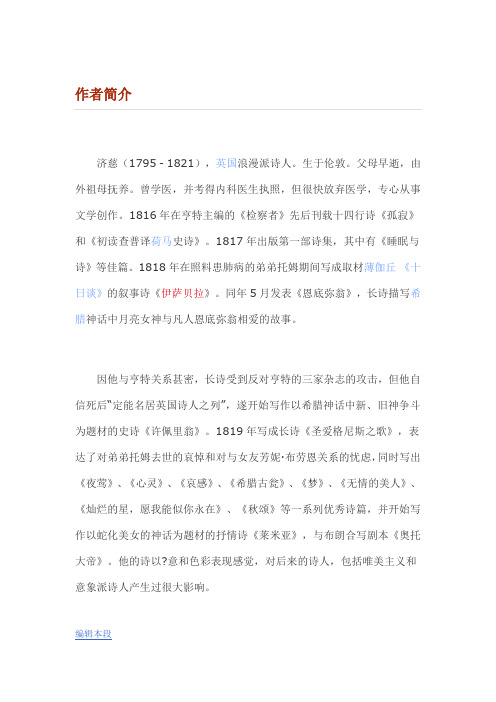
济慈(1795 - 1821),英国浪漫派诗人。
生于伦敦。
父母早逝,由外祖母抚养。
曾学医,并考得内科医生执照,但很快放弃医学,专心从事文学创作。
1816年在亨特主编的《检察者》先后刊载十四行诗《孤寂》和《初读查普译荷马史诗》。
1817年出版第一部诗集,其中有《睡眠与诗》等佳篇。
1818年在照料患肺病的弟弟托姆期间写成取材薄伽丘《十日谈》的叙事诗《伊萨贝拉》。
同年5月发表《恩底弥翁》,长诗描写希腊神话中月亮女神与凡人恩底弥翁相爱的故事。
因他与亨特关系甚密,长诗受到反对亨特的三家杂志的攻击,但他自信死后“定能名居英国诗人之列”,遂开始写作以希腊神话中新、旧神争斗为题材的史诗《许佩里翁》。
1819年写成长诗《圣爱格尼斯之歌》,表达了对弟弟托姆去世的哀悼和对与女友芳妮·布劳恩关系的忧虑,同时写出《夜莺》、《心灵》、《哀感》、《希腊古瓮》、《梦》、《无情的美人》、《灿烂的星,愿我能似你永在》、《秋颂》等一系列优秀诗篇,并开始写作以蛇化美女的神话为题材的抒情诗《莱米亚》,与布朗合写剧本《奥托大帝》。
他的诗以?意和色彩表现感觉,对后来的诗人,包括唯美主义和意象派诗人产生过很大影响。
1818年,济慈23岁。
那年,诗人患上了肺痨,同时诗人还处于和范妮·布恩小姐的热恋中。
正如诗人自己说的,他常常想的两件事就是爱情的甜蜜和自己死去的时间。
在这样的情况下,诗人情绪激昂,心中充满着悲愤和对生命的渴望。
在一个深沉的夜晚,在浓密的树枝下,在鸟儿嘹亮的歌声中,诗人一口气写下了这首8节80多行的《夜莺颂》。
在《夜莺颂》中,诗人的着眼点不在夜莺本身,而是着力于抒写由莺啼诱发而出的想象与幻想的色彩,并从对立冲突中充分展示了诗人听到莺歌时的内在心境。
《夜莺颂》八节,每节十行。
开篇诗人即展开了两个意象的交叉,一是诗人的“心痛”,二是夜莺的“欢欣”。
病魔缠身的诗人听到夜莺充满生命活力的被剥夺,“心痛”得觉要沉入遗忘一切的河流,同时又为夜莺的“欢欣”所感染——那林泽仙子在绿荫中无羁无绊,自由欢快地生活,令诗人倾慕,生活是多么的珍贵和甜美啊!这种苦中之乐表露了诗人对生活的挚爱之深,对旺盛生命力的景仰。
济慈的两首浪漫主义诗歌《夜莺颂》和《希腊古瓮颂》赏析

济慈的两首浪漫主义诗歌《夜莺颂》和《希腊古瓮颂》赏析
英国浪漫主义诗人、作家华兹华斯·米尔福特·维果洛的《夜莺颂》和《希腊
古瓮颂》,充满着浪漫气息,满载着情感丰沃的激情,分别赋于生活迷人的仪式感,以及抒发离别悲怆的精神色彩。
《夜莺颂》写出夜晚的自然风景,夏夜中的流动的繁华容颜、无穷无尽的绚烂
仙景,以及繁星在空中交相辉映,深夜对月映衬而不致苍白的场景,向晨曦里的踏青者宣告着持续的欢愉。
唯美的诗句营造出跳动灵魂的优雅意犹,愉悦的情绪溢满整首诗的动人之处,那恬淡的氛围让诗人在思绪飘荡中遥望天际,发掘夜晚深处藏起的身居景尔。
另一首诗歌《希腊古瓮颂》是维果洛发自内心的表达,描绘他离别希腊,离开
曾经数度间次踏上的西南岛,满腔思念之情从文字涌出,几许怅别之色,几许浪漫情怀融于宽广的地域中,厚重里表现出一个人内心深处对家乡述说的落寞,一颦一笑中言之有物,营造出深浅不一变化多端的感慨。
华兹华斯·米尔福特·维果洛的两首浪漫诗歌,用情绪漫滴的抒情力量惊艳文字,唤起深处的感受,表现出维果洛的清新想像力,暗示着这位美妙的诗人深情地述说人们对生活、家乡以及离别的深沉情思。
它们将唯美滋养着我们,让被日常繁琐所扰乱的心灵放松下来,享受浪漫诗歌带来的梦一般的惬意。
夜莺颂

夜莺颂《夜莺颂》我的心在痛,困顿和麻木刺进了感官,有如饮过毒鸠,又象是刚刚把鸦片吞服,于是向着列斯忘川下沉:并不是我嫉妒你的好运,而是你的快乐使我太欢欣——因为在林间嘹亮的天地里,你呵,轻翅的仙灵,你躲进山毛榉的葱绿和荫影,放开歌喉,歌唱着夏季。
哎,要是有一口酒!那冷藏在地下多年的清醇饮料,一尝就令人想起绿色之邦,想起花神,恋歌,阳光和舞蹈!要是有一杯南国的温暖充满了鲜红的灵感之泉,杯沿明灭着珍珠的泡沫,给嘴唇染上紫斑;哦,我要一饮而离开尘寰,和你同去幽暗的林中隐没:远远地、远远隐没,让我忘掉你在树叶间从不知道的一切,忘记这疲劳、热病、和焦躁,这使人对坐而悲叹的世界;在这里,青春苍白、消瘦、死亡,而“瘫痪”有几根白发在摇摆;在这里,稍一思索就充满了忧伤和灰色的绝望,而“美”保持不住明眸的光彩,新生的爱情活不到明天就枯凋。
去吧!去吧!我要朝你飞去,不用和酒神坐文豹的车驾,我要展开诗歌底无形羽翼,尽管这头脑已经困顿、疲乏;去了!呵,我已经和你同往!夜这般温柔,月后正登上宝座,周围是侍卫她的一群星星;但这儿却不甚明亮,除了有一线天光,被微风带过,葱绿的幽暗,和苔藓的曲径。
我看不出是哪种花草在脚旁,什么清香的花挂在树枝上;在温馨的幽暗里,我只能猜想这个时令该把哪种芬芳赋予这果树,林莽,和草丛,这白枳花,和田野的玫瑰,这绿叶堆中易谢的紫罗兰,还有五月中旬的娇宠,这缀满了露酒的麝香蔷薇,它成了夏夜蚊蚋的嗡萦的港湾。
我在黑暗里倾听:呵,多少次我几乎爱上了静谧的死亡,我在诗思里用尽了好的言辞,求他把我的一息散入空茫;而现在,哦,死更是多么富丽:在午夜里溘然魂离人间,当你正倾泻着你的心怀发出这般的狂喜!你仍将歌唱,但我却不再听见——你的葬歌只能唱给泥草一块。
永生的鸟呵,你不会死去!饥饿的世代无法将你蹂躏;今夜,我偶然听到的歌曲曾使古代的帝王和村夫喜悦;或许这同样的歌也曾激荡露丝忧郁的心,使她不禁落泪,站在异邦的谷田里想着家;就是这声音常常在失掉了的仙域里引动窗扉:一个美女望着大海险恶的浪花。
英文诗歌鉴赏对比研究-夜莺颂(济慈)和我孤独地漫游-像一朵云(华兹华斯)
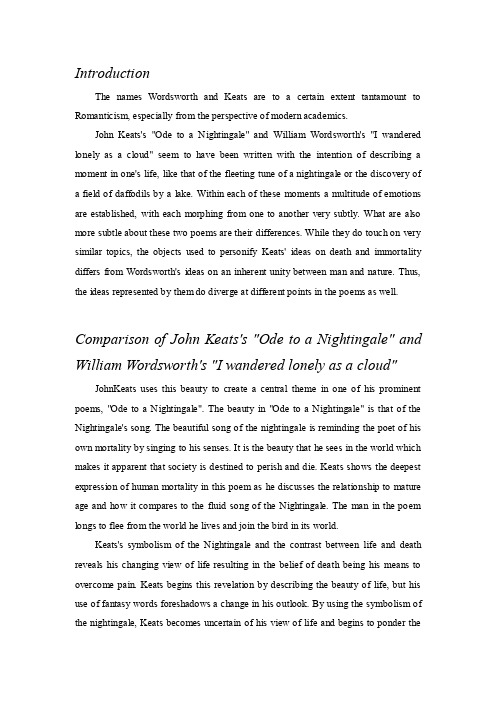
IntroductionThe names Wordsworth and Keats are to a certain extent tantamount to Romanticism, especially from the perspective of modern academics.John Keats's "Ode to a Nightingale" and William Wordsworth's "I wandered lonely as a cloud" seem to have been written with the intention of describing a moment in one's life, like that of the fleeting tune of a nightingale or the discovery of a field of daffodils by a lake. Within each of these moments a multitude of emotions are established, with each morphing from one to another very subtly. What are also more subtle about these two poems are their differences. While they do touch on very similar topics, the objects used to personify Keats' ideas on death and immortality differs from Wordsworth's ideas on an inherent unity between man and nature. Thus, the ideas represented by them do diverge at different points in the poems as well.Comparison of John Keats's "Ode to a Nightingale" and William Wordsworth's "I wandered lonely as a cloud"JohnKeats uses this beauty to create a central theme in one of his prominent poems, "Ode to a Nightingale". The beauty in "Ode to a Nightingale" is that of the Nightingale's song. The beautiful song of the nightingale is reminding the poet of his own mortality by singing to his senses. It is the beauty that he sees in the world which makes it apparent that society is destined to perish and die. Keats shows the deepest expression of human mortality in this poem as he discusses the relationship to mature age and how it compares to the fluid song of the Nightingale. The man in the poem longs to flee from the world he lives and join the bird in its world.Keats's symbolism of the Nightingale and the contrast between life and death reveals his changing view of life resulting in the belief of death being his means to overcome pain. Keats begins this revelation by describing the beauty of life, but his use of fantasy words foreshadows a change in his outlook. By using the symbolism of the nightingale, Keats becomes uncertain of his view of life and begins to ponder theconcept of death. In the conclusion, Keats feels deceived by the nightingale's representation of life, and desires death to overcome his pain instead of enduring it in life.As Keats continues his thoughts, he becomes more and more skeptical of life. Fascinated by the nightingale, Keats recognizes the bird's innocence: "What thou among the leaves hast never known, /The weariness, The fever, and the fret". One would fret when uneasy or uncertain towards a matter. Keats reveals that the nightingale is oblivious to the concept of death as it sings its melody. The nightingale is completely free for it does not know about death. Keats becomes tormented by the innocence and freedom of the bird, as all of Keats' uncertainties regarding life and death overwhelm him: "Where but to think is to be full of sorrow". Living his life brings a constant reminder of his pain, driving Keats to change his opinion of life and death.Similarly, as a great poet of nature, William Wordsworth wrote many famous poems to express his love for nature, one of which is "I wandered lonely as a cloud". In the narrative poem, the poet successfully compared his loneliness with the happy and vital daffodils. The daffodils, the symbol of the nature, bring great joy and relief to the speaker. So Wordsworth's conception of nature is that nature has a lot to do with man, it can not only refresh one's soul and fill one with happiness, but it can also be reduced into a beautiful memory which will comfort one's heart when in solitude.I chose the poem "I wandered lonely as a cloud" by William Wordsworth because I like the imagery in it of dancing daffodils. Upon closer examination, I realized that most of this imagery is created by the many metaphors and similes Wordsworth uses. In the first line, Wordsworth says "I wandered lonely as a cloud". This is a simile comparing the wondering of a man to a cloud drifting through the sky.I suppose the wandering cloud is lonely because there is nothing up there that high in the sky besides it. It can pass by unnoticed, touching nothing. Also, the image of a cloud brings to mind a light, carefree sort of wandering. The cloud is not bound by any obstacle, but can go wherever the whim of the wind takes it.This simple poem, one of the loveliest and most famous in the Wordsworthcanon, revisits the familiar subjects of nature and memory, this time with a particularly (simple) spare, musical eloquence. The plot is extremely simple, depicting the poet's wandering and his discovery of a field of daffodils by a lake, the memory of which pleases him and comforts him when he is lonely, bored, or restless. Romantic poet William Wordsworth's "I Wandered Lonely as a Cloud" extols the virtue of nature and highlights the value of participating in its beauty.ConclusionIn "Ode to a Nightingale" and" I wandered lonely as a cloud ", both poems tells of an experience in which the human characters encounters nature in the poems, and the experiences are handled quite differently in the two poems. Natures have always held significance in human lives. They achieved heights unattainable to humans and sung while they did that. These two poets use nature as their muse and also symbolically for the human experience. The two poems, "Ode to a Nightingale" and "I wandered lonely as a cloud", clearly portray both of the poets' treatment on the idea of escape.Both poems construct vivid illusions but insist on their desolating failure. The poems do seem similar in several ways because in both, Keats and Wordsworth do portray symbols of realism while depicting the nature, as well as the spectrum of emotions from grief to joy. The central themes of the two poems are neither a nightingale nor a daffodil, but, the poets' eternal search for a center of refuge in a world of flux. It is through such a conception that Keats and Wordsworth sets to resolve the dichotomy between the world of the ideal and that of reality within the order of experience.Reference[1]Plumly, Stanley.: "The immortal evening: a legendary dinner with Keats, Wordsworth, and Lamb." New Y ork; London: Norton, 2014. pp. 368. (2014)[2]Lau, Beth.: review of Stillinger, Jack. "Romantic complexity: Keats, Coleridge, and Wordsworth." Studies in Romanticism (47:3) 2008, 420-5. (2008)[3]Horrell, William C.: review of Milnes, Tim. "The truth about Romanticism: pragmatism and idealism in Keats, Shelley,Wordsworth and Coleridge."Wordsworth Circle (42:4) 2011, 266-9. (2011)[4]Burkett, Andrew.: review of Roe, Nicholas. "John Keats: a new life." Studies in Romanticism (54:1) 2015, 138-42. (2015)[5]Michael, Timothy.: review of Milnes, Tim. "The truth about Romanticism: pragmatism and idealism in Keats, Shelley, Coleridge." Romanticism (19:1) 2013, 101-3. (2013)[6]Scott, Matthew.: "Wordsworth among the Romantics." In (pp. 749-66) Gravil, Richard; Robinson, Daniel (eds). The Oxford handbook of William Wordsworth. Oxford; New Y ork: [2015:458328]. (2015)[7] Wu, Duncan.: "Wordsworth and sensibility." In (pp. 467-81) Gravil, Richard; Robinson, Daniel (eds). The Oxford handbook of William Wordsworth. Oxford; New Y ork [2015:458328]. (2015)。
夜莺颂 作品赏析
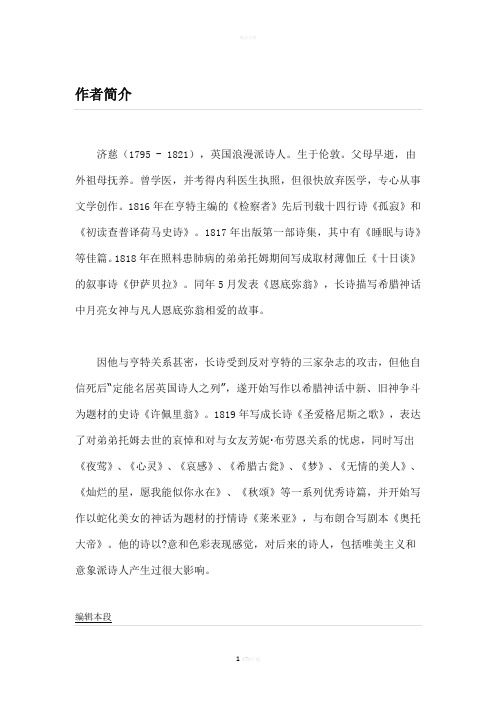
济慈(1795 - 1821),英国浪漫派诗人。
生于伦敦。
父母早逝,由外祖母抚养。
曾学医,并考得内科医生执照,但很快放弃医学,专心从事文学创作。
1816年在亨特主编的《检察者》先后刊载十四行诗《孤寂》和《初读查普译荷马史诗》。
1817年出版第一部诗集,其中有《睡眠与诗》等佳篇。
1818年在照料患肺病的弟弟托姆期间写成取材薄伽丘《十日谈》的叙事诗《伊萨贝拉》。
同年5月发表《恩底弥翁》,长诗描写希腊神话中月亮女神与凡人恩底弥翁相爱的故事。
因他与亨特关系甚密,长诗受到反对亨特的三家杂志的攻击,但他自信死后“定能名居英国诗人之列”,遂开始写作以希腊神话中新、旧神争斗为题材的史诗《许佩里翁》。
1819年写成长诗《圣爱格尼斯之歌》,表达了对弟弟托姆去世的哀悼和对与女友芳妮·布劳恩关系的忧虑,同时写出《夜莺》、《心灵》、《哀感》、《希腊古瓮》、《梦》、《无情的美人》、《灿烂的星,愿我能似你永在》、《秋颂》等一系列优秀诗篇,并开始写作以蛇化美女的神话为题材的抒情诗《莱米亚》,与布朗合写剧本《奥托大帝》。
他的诗以?意和色彩表现感觉,对后来的诗人,包括唯美主义和意象派诗人产生过很大影响。
1818年,济慈23岁。
那年,诗人患上了肺痨,同时诗人还处于和范妮·布恩小姐的热恋中。
正如诗人自己说的,他常常想的两件事就是爱情的甜蜜和自己死去的时间。
在这样的情况下,诗人情绪激昂,心中充满着悲愤和对生命的渴望。
在一个深沉的夜晚,在浓密的树枝下,在鸟儿嘹亮的歌声中,诗人一口气写下了这首8节80多行的《夜莺颂》。
在《夜莺颂》中,诗人的着眼点不在夜莺本身,而是着力于抒写由莺啼诱发而出的想象与幻想的色彩,并从对立冲突中充分展示了诗人听到莺歌时的内在心境。
《夜莺颂》八节,每节十行。
开篇诗人即展开了两个意象的交叉,一是诗人的“心痛”,二是夜莺的“欢欣”。
病魔缠身的诗人听到夜莺充满生命活力的被剥夺,“心痛”得觉要沉入遗忘一切的河流,同时又为夜莺的“欢欣”所感染——那林泽仙子在绿荫中无羁无绊,自由欢快地生活,令诗人倾慕,生活是多么的珍贵和甜美啊!这种苦中之乐表露了诗人对生活的挚爱之深,对旺盛生命力的景仰。
济慈夜莺颂欣赏
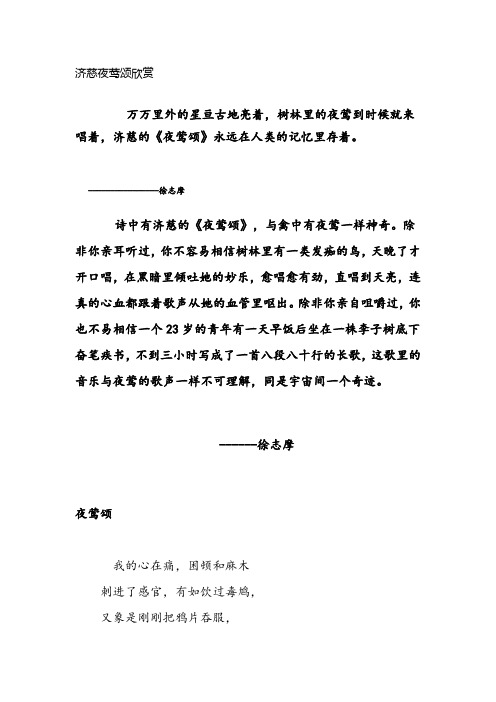
济慈夜莺颂欣赏万万里外的星亘古地亮着,树林里的夜莺到时候就来唱着,济慈的《夜莺颂》永远在人类的记忆里存着。
----------------徐志摩诗中有济慈的《夜莺颂》,与禽中有夜莺一样神奇。
除非你亲耳听过,你不容易相信树林里有一类发痴的鸟,天晚了才开口唱,在黑暗里倾吐她的妙乐,愈唱愈有劲,直唱到天亮,连真的心血都跟着歌声从她的血管里呕出。
除非你亲自咀嚼过,你也不易相信一个23岁的青年有一天早饭后坐在一株李子树底下奋笔疾书,不到三小时写成了一首八段八十行的长歌,这歌里的音乐与夜莺的歌声一样不可理解,同是宇宙间一个奇迹。
------徐志摩夜莺颂我的心在痛,困顿和麻木刺进了感官,有如饮过毒鸠,又象是刚刚把鸦片吞服,于是向着列斯忘川下沉:并不是我嫉妒你的好运,而是你的快乐使我太欢欣--因为在林间嘹亮的天地里,你呵,轻翅的仙灵,你躲进山毛榉的葱绿和荫影,放开歌喉,歌唱着夏季。
哎,要是有一口酒!那冷藏在地下多年的清醇饮料,一尝就令人想起绿色之邦,想起花神,恋歌,阳光和舞蹈!要是有一杯南国的温暖充满了鲜红的灵感之泉,杯沿明灭着珍珠的泡沫,给嘴唇染上紫斑;哦,我要一饮而离开尘寰,和你同去幽暗的林中隐没:远远地、远远隐没,让我忘掉你在树叶间从不知道的一切,忘记这疲劳、热病、和焦躁,这使人对坐而悲叹的世界;在这里,青春苍白、消瘦、死亡,而“瘫痪”有几根白发在摇摆;在这里,稍一思索就充满了忧伤和灰色的绝望,而“美”保持不住明眸的光彩,新生的爱情活不到明天就枯凋。
去吧!去吧!我要朝你飞去,不用和酒神坐文豹的车驾,我要展开诗歌底无形羽翼,尽管这头脑已经困顿、疲乏;去了!呵,我已经和你同往!夜这般温柔,月后正登上宝座,周围是侍卫她的一群星星;但这儿却不甚明亮,除了有一线天光,被微风带过,葱绿的幽暗,和苔藓的曲径。
我看不出是哪种花草在脚旁,什么清香的花挂在树枝上;在温馨的幽暗里,我只能猜想这个时令该把哪种芬芳赋予这果树,林莽,和草丛,这白枳花,和田野的玫瑰,这绿叶堆中易谢的紫罗兰,还有五月中旬的娇宠,这缀满了露酒的麝香蔷薇,它成了夏夜蚊蚋的嗡萦的港湾。
夜莺颂
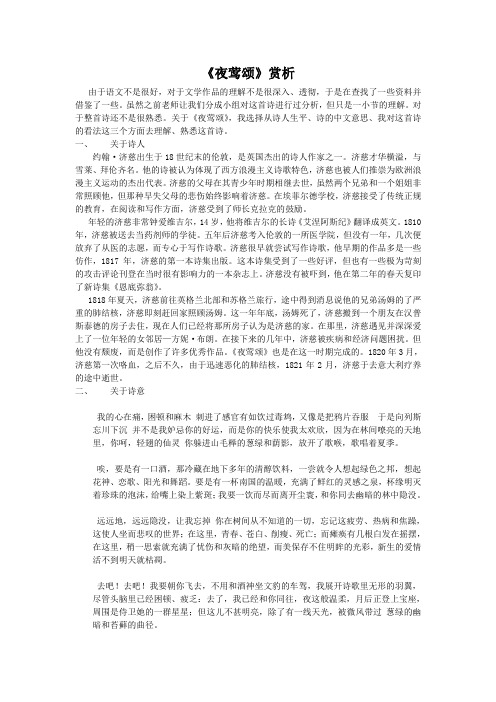
《夜莺颂》赏析由于语文不是很好,对于文学作品的理解不是很深入、透彻,于是在查找了一些资料并借鉴了一些。
虽然之前老师让我们分成小组对这首诗进行过分析,但只是一小节的理解。
对于整首诗还不是很熟悉。
关于《夜莺颂》,我选择从诗人生平、诗的中文意思、我对这首诗的看法这三个方面去理解、熟悉这首诗。
一、关于诗人约翰·济慈出生于18世纪末的伦敦,是英国杰出的诗人作家之一。
济慈才华横溢,与雪莱、拜伦齐名。
他的诗被认为体现了西方浪漫主义诗歌特色,济慈也被人们推崇为欧洲浪漫主义运动的杰出代表。
济慈的父母在其青少年时期相继去世,虽然两个兄弟和一个姐姐非常照顾他,但那种早失父母的悲伤始终影响着济慈。
在埃菲尔德学校,济慈接受了传统正规的教育,在阅读和写作方面,济慈受到了师长克拉克的鼓励。
年轻的济慈非常钟爱维吉尔,14岁,他将维吉尔的长诗《艾涅阿斯纪》翻译成英文。
1810年,济慈被送去当药剂师的学徒。
五年后济慈考入伦敦的一所医学院,但没有一年,几次便放弃了从医的志愿,而专心于写作诗歌。
济慈很早就尝试写作诗歌,他早期的作品多是一些仿作,1817年,济慈的第一本诗集出版。
这本诗集受到了一些好评,但也有一些极为苛刻的攻击评论刊登在当时很有影响力的一本杂志上。
济慈没有被吓到,他在第二年的春天复印了新诗集《恩底弥翁》。
1818年夏天,济慈前往英格兰北部和苏格兰旅行,途中得到消息说他的兄弟汤姆的了严重的肺结核,济慈即刻赶回家照顾汤姆。
这一年年底,汤姆死了,济慈搬到一个朋友在汉普斯泰德的房子去住,现在人们已经将那所房子认为是济慈的家。
在那里,济慈遇见并深深爱上了一位年轻的女邻居—方妮·布朗。
在接下来的几年中,济慈被疾病和经济问题困扰。
但他没有颓废,而是创作了许多优秀作品。
《夜莺颂》也是在这一时期完成的。
1820年3月,济慈第一次咯血,之后不久,由于迅速恶化的肺结核,1821年2月,济慈于去意大利疗养的途中逝世。
二、关于诗意我的心在痛,困顿和麻木刺进了感官有如饮过毒鸩,又像是把鸦片吞服于是向列斯忘川下沉并不是我妒忌你的好运,而是你的快乐使我太欢欣,因为在林间嘹亮的天地里,你呵,轻翅的仙灵你躲进山毛榉的葱绿和荫影,放开了歌喉,歌唱着夏季。
英译汉诗歌经典作品

英译汉诗歌经典作品以下是一些经典的英文诗歌及其汉译版本:1. 济慈 (John Keats) -《夜莺颂》(Ode to a Nightingale)原文:"My heart aches, and a drowsy numbness painsMy sense, as though of hemlock I had drunk,Or emptied some dull opiate to the drainsOne minute past, and Lethe-wards had sunk:'Tis not through envy of thy happy lot,But being too happy in thine happiness,—"汉译:“我的心儿痛楚,仿佛饮了毒草,或者我曾将沉闷的安眠药倾倒,一分钟过去,便向忘川沉落;并非出于对你幸福命运的嫉妒,而是因你在幸福中的过于陶醉……”2. 雪莱 (Percy Bysshe Shelley) -《西风颂》(Ode to the West Wind)原文:"Drive my dead thoughts over the universeLike withered leaves to quicken a new birth!"汉译:“驱散我死去的思想穿越宇宙,如同枯叶催促新生的到来!”3. 罗伯特·弗罗斯特 (Robert Frost) -《未选择的路》(The Road Not Taken)原文:"Two roads diverged in a yellow wood,And sorry I could not travel bothAnd be one traveler, long I stoodAnd looked down one as far as I couldTo where it bent in the undergrowth;"汉译:“林中有两条岔路供我选行,我很遗憾不能同时踏上两径。
夜莺颂作品赏析
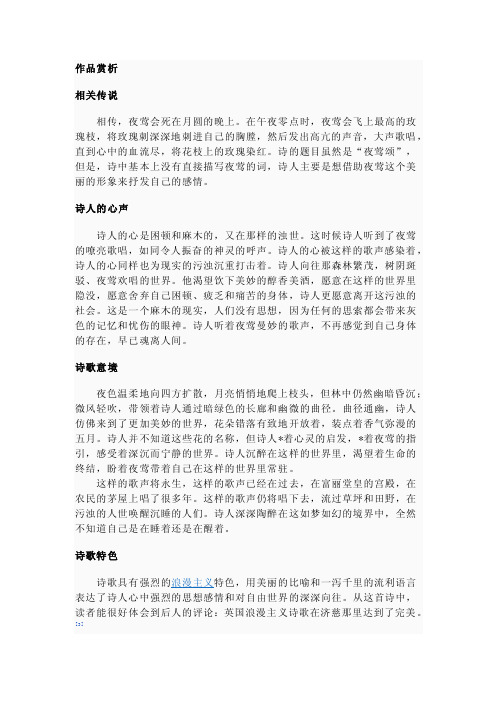
相关传说相传,夜莺会死在月圆的晚上。
在午夜零点时,夜莺会飞上最高的玫瑰枝,将玫瑰刺深深地刺进自己的胸膛,然后发出高亢的声音,大声歌唱,直到心中的血流尽,将花枝上的玫瑰染红。
诗的题目虽然是“夜莺颂”,但是,诗中基本上没有直接描写夜莺的词,诗人主要是想借助夜莺这个美丽的形象来抒发自己的感情。
诗人的心声诗人的心是困顿和麻木的,又在那样的浊世。
这时候诗人听到了夜莺的嘹亮歌唱,如同令人振奋的神灵的呼声。
诗人的心被这样的歌声感染着,诗人的心同样也为现实的污浊沉重打击着。
诗人向往那森林繁茂,树阴斑驳、夜莺欢唱的世界。
他渴望饮下美妙的醇香美酒,愿意在这样的世界里隐没,愿意舍弃自己困顿、疲乏和痛苦的身体,诗人更愿意离开这污浊的社会。
这是一个麻木的现实,人们没有思想,因为任何的思索都会带来灰色的记忆和忧伤的眼神。
诗人听着夜莺曼妙的歌声,不再感觉到自己身体的存在,早已魂离人间。
诗歌意境夜色温柔地向四方扩散,月亮悄悄地爬上枝头,但林中仍然幽暗昏沉;微风轻吹,带领着诗人通过暗绿色的长廊和幽微的曲径。
曲径通幽,诗人仿佛来到了更加美妙的世界,花朵错落有致地开放着,装点着香气弥漫的五月。
诗人并不知道这些花的名称,但诗人*着心灵的启发,*着夜莺的指引,感受着深沉而宁静的世界。
诗人沉醉在这样的世界里,渴望着生命的终结,盼着夜莺带着自己在这样的世界里常驻。
这样的歌声将永生,这样的歌声已经在过去,在富丽堂皇的宫殿,在农民的茅屋上唱了很多年。
这样的歌声仍将唱下去,流过草坪和田野,在污浊的人世唤醒沉睡的人们。
诗人深深陶醉在这如梦如幻的境界中,全然不知道自己是在睡着还是在醒着。
诗歌特色诗歌具有强烈的浪漫主义特色,用美丽的比喻和一泻千里的流利语言表达了诗人心中强烈的思想感情和对自由世界的深深向往。
从这首诗中,读者能很好体会到后人的评论:英国浪漫主义诗歌在济慈那里达到了完美。
[3]1818年,济慈23岁。
那年,诗人患上了肺痨,同时诗人还处于和范妮·布恩小姐的热恋中。
浅析济慈《夜莺颂》
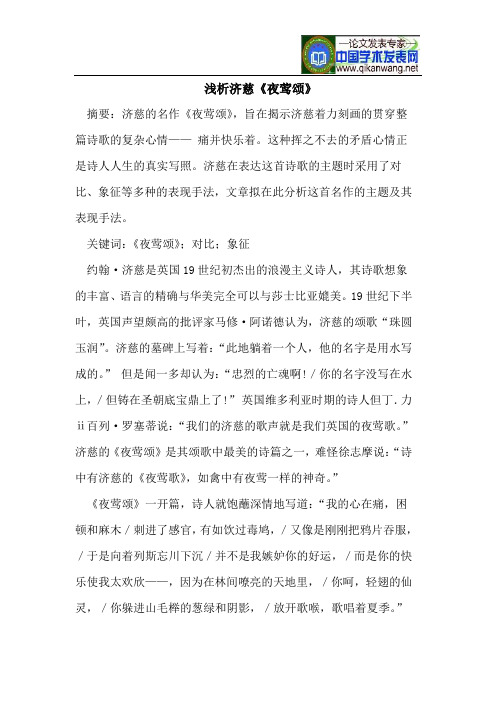
浅析济慈《夜莺颂》摘要:济慈的名作《夜莺颂》,旨在揭示济慈着力刻画的贯穿整篇诗歌的复杂心情——痛并快乐着。
这种挥之不去的矛盾心情正是诗人人生的真实写照。
济慈在表达这首诗歌的主题时采用了对比、象征等多种的表现手法,文章拟在此分析这首名作的主题及其表现手法。
关键词:《夜莺颂》;对比;象征约翰·济慈是英国19世纪初杰出的浪漫主义诗人,其诗歌想象的丰富、语言的精确与华美完全可以与莎士比亚媲美。
19世纪下半叶,英国声望颇高的批评家马修·阿诺德认为,济慈的颂歌“珠圆玉润”。
济慈的墓碑上写着:“此地躺着一个人,他的名字是用水写成的。
”但是闻一多却认为:“忠烈的亡魂啊!/你的名字没写在水上,/但铸在圣朝底宝鼎上了!”英国维多利亚时期的诗人但丁.力ⅱ百列·罗塞蒂说:“我们的济慈的歌声就是我们英国的夜莺歌。
”济慈的《夜莺颂》是其颂歌中最美的诗篇之一,难怪徐志摩说:“诗中有济慈的《夜莺歌》,如禽中有夜莺一样的神奇。
”《夜莺颂》一开篇,诗人就饱蘸深情地写道:“我的心在痛,困顿和麻木/刺进了感官,有如饮过毒鸠,/又像是刚刚把鸦片吞服,/于是向着列斯忘川下沉/并不是我嫉妒你的好运,/而是你的快乐使我太欢欣——,因为在林间嘹亮的天地里,/你呵,轻翅的仙灵,/你躲进山毛榉的葱绿和阴影,/放开歌喉,歌唱着夏季。
”诗人听着夜莺的嘹亮而美妙的歌唱,心被这快乐的歌声感染着。
这种快活太尖锐了,诗人甚至感到心儿在痛,感到自己像是被麻痹了一样。
他向往那林阴繁茂的夜莺欢唱的世界,但是残酷的现实使他又不能够完全投入和享受这种快乐,诗人的心被现实世界的“不尽如人意的因素”打击着。
于是诗人想到了以酒解千愁。
唉,要是有口陈年的佳酿该有多好!“那冷藏/在地下多年的清醇饮料,/一尝就令人想起绿色之邦,/想起花神,恋歌,阳光和舞蹈!”诗人渴望饮下这美妙的醇香美酒,让自己从困顿、疲乏和痛苦的身体游离了出来,与夜莺共入深林,“远远地、远远隐没,让我忘掉/你在树叶问从不知道的一切”。
Keats(夜莺颂)
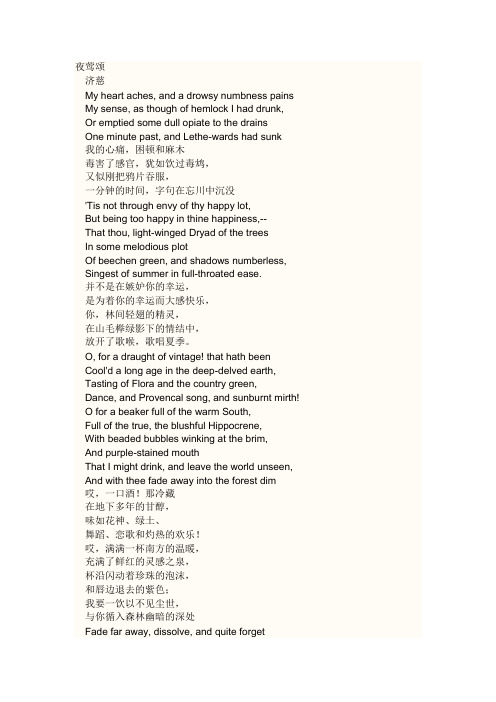
夜莺颂济慈My heart aches, and a drowsy numbness pains My sense, as though of hemlock I had drunk,Or emptied some dull opiate to the drainsOne minute past, and Lethe-wards had sunk我的心痛,困顿和麻木毒害了感官,犹如饮过毒鸩,又似刚把鸦片吞服,一分钟的时间,字句在忘川中沉没'Tis not through envy of thy happy lot,But being too happy in thine happiness,--That thou, light-winged Dryad of the treesIn some melodious plotOf beechen green, and shadows numberless, Singest of summer in full-throated ease.并不是在嫉妒你的幸运,是为着你的幸运而大感快乐,你,林间轻翅的精灵,在山毛榉绿影下的情结中,放开了歌喉,歌唱夏季。
O, for a draught of vintage! that hath beenCool'd a long age in the deep-delved earth, Tasting of Flora and the country green, Dance, and Provencal song, and sunburnt mirth! O for a beaker full of the warm South,Full of the true, the blushful Hippocrene,With beaded bubbles winking at the brim,And purple-stained mouthThat I might drink, and leave the world unseen, And with thee fade away into the forest dim哎,一口酒!那冷藏在地下多年的甘醇,味如花神、绿土、舞蹈、恋歌和灼热的欢乐!哎,满满一杯南方的温暖,充满了鲜红的灵感之泉,杯沿闪动着珍珠的泡沫,和唇边退去的紫色;我要一饮以不见尘世,与你循入森林幽暗的深处Fade far away, dissolve, and quite forgetWhat thou among the leaves hast never known,The weariness, the fever, and the fretHere, where men sit and hear each other groan; Where palsy shakes a few, sad, last gray hairs, Where youth grows pale, and spectre-thin, and dies; Where but to think is to be full of sorrowAnd leaden-eyed despairs,Where Beauty cannot keep her lustrous eyes,Or new Love pine at them beyond to-morrow.远远的离开,消失,彻底忘记林中的你从不知道的,疲惫、热病和急躁这里,人们坐下并听着彼此的呻吟;瘫痪摇动了一会儿,悲伤了,最后的几丝白发,青春苍白,古怪的消瘦下去,后来死亡;铅色的眼睛绝望着;美人守不住明眸,新的恋情过不完明天。
夜莺颂ode to a nightingale
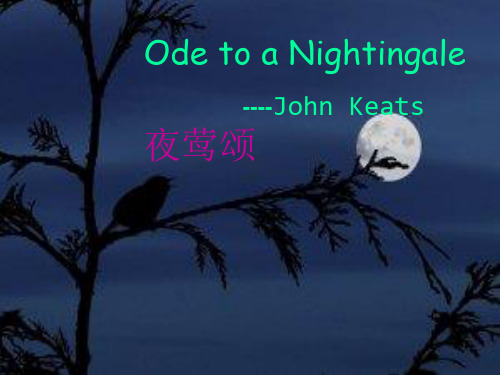
The lifetime of John Keats
The poet
John Keats (31 October 1795 – 23 February 1821) was an English Romantic poet. He was one of the main figures of the second generation of Romantic poets along with Lord Byron 拜伦 and Percy Bysshe Shelley波比雪莱 , despite his work only having been in publication for four years before his death. Although his poems were not generally well received by critics • ( during his life, his reputation grew after his death, so that by the end of the 19th century he had become one of the most beloved of all English poets. He had a significant influence on a diverse range of poets and writers. Jorge Luis Borges stated that his first encounter with Keats was the most significant literary experience of his life.
两个意象的交叉
诗人的“心莺的“欢欣”
Structure[edit]
英文诗歌:夜莺颂

济慈⼀⽣来去匆匆,终年⼆⼗五岁,但却给我们留下了许多美丽的诗篇。
奇怪的是,虽然⽣前饱受贫困,疾病的折磨,且并不为世所认同,他的诗当中只有他⾃⼰所向往的绝美世界,仿佛现实⽣活的残酷与⿊暗都没有给那些诗留下任何印记。
也许有⼈会说济慈的诗“病态”,“颓废”,那是不公正的。
在他的诗歌中我们看到的美,都是有⾎有⾁,“仿佛如⼀⽚树叶⽣长那么⾃然”。
仔细阅读就会发现,现实的苦难确实在诗歌中投下了阴影,但马上,阴影就为光明所吞没。
更让⼈惊讶的是,有⼈说济慈“与古希腊⽂明与⽣俱来的⼼灵相通”,这所指的并⾮他的诗⼤多以古希腊为题材,⽽是说他诗歌中与古希腊⽂明⼀脉相承的,透明纯净的美。
这些,只有读者⾃⼰慢慢体会了。
Ode to a NightingaleI.MY heart aches, and a drowsy numbness painsMy sense, as though of hemlock I had drunk,Or emptied some dull opiate to the drainsOne minute past, and Lethe-wards had sunk:’Tis not through envy of thy happy lot,But being too happy in thine happiness,-That thou, light-winged Dryad of the trees,In some melodious plotOf beechen green, and shadows numberless,Singest of summer in full-throated ease.II.O, for a draught of vintage! that hath beenCool’d a long age in the deep-delved earth,Tasting of Flora and the country green,Dance, and Provencal song, and sunburnt mirth!O for a beaker full of the warm South,Full of the true, the blushful Hippocrene,With beaded bubbles winking at the brim,And purple-stained mouth;That I might drink, and leave the world unseen,And with thee fade away into the forest dim:III.Fade far away, dissolve, and quite forgetWhat thou among the leaves hast never known,The weariness, the fever, and the fretHere, where men sit and hear each other groan;Where palsy shakes a few, sad, last gray hairs,Where youth grows pale, and spectre-thin, and dies;Where but to think is to be full of sorrowAnd leaden-eyed despairs,Where Beauty cannot keep her lustrous eyes,Or new Love pine at them beyond to-morrow.IV.Away! away! for I will fly to thee,Not charioted by Bacchus and his pards,But on the viewless wings of Poesy,Though the dull brain perplexes and retards:Already with thee! tender is the night,And haply the Queen-Moon is on her throne,Cluster’d around by all her starry Fays;But here there is no light,Save what from heaven is with the breezes blownThrough verdurous glooms and winding mossy ways.V.I cannot see what flowers are at my feet,Nor what soft incense hangs upon the boughs, But, in embalmed darkness, guess each sweet Wherewith the seasonable month endowsThe grass, the thicket, and the fruit-tree wild; White hawthorn, and the pastoral eglantine;Fast fading violets cover’d up in leaves;And mid-May’s eldest child,The coming musk-rose, full of dewy wine,The murmurous haunt of flies on summer eves. VI.Darkling I listen; and, for many a timeI have been half in love with easeful Death,Call’d him soft names in many a mused rhyme,To take into the air my quiet breath;Now more than ever seems it rich to die,To cease upon the midnight with no pain,While thou art pouring forth thy soul abroadIn such an ecstasy!Still wouldst thou sing, and I have ears in vain -To thy high requiem become a sod.VII.Thou wast not born for death, immortal Bird!No hungry generations tread thee down;The voice I hear this passing night was heardIn ancient days by emperor and clown:Perhaps the self-same song that found a path Through the sad heart of Ruth, when, sick for home, She stood in tears amid the alien corn;The same that oft-times hathCharm’d magic casements, opening on the foam Of perilous seas, in faery lands forlorn.。
- 1、下载文档前请自行甄别文档内容的完整性,平台不提供额外的编辑、内容补充、找答案等附加服务。
- 2、"仅部分预览"的文档,不可在线预览部分如存在完整性等问题,可反馈申请退款(可完整预览的文档不适用该条件!)。
- 3、如文档侵犯您的权益,请联系客服反馈,我们会尽快为您处理(人工客服工作时间:9:00-18:30)。
济慈名诗夜莺颂中英对照欣赏约翰济慈,他遗下的诗篇誉满人间,他的诗被认为完美体现了西方浪漫主义诗歌特色。
今天学习啦小编在这里为大家介绍济慈的名诗《夜莺颂》,欢迎大家阅读!济慈名诗夜莺颂中英对照O d e t o a N i g h t i n g a l e 《夜莺颂》M y h e a r t a c h e s,a n d a d r o w s y n u m b n e s s p a i n s 我的心在痛,困顿和麻木M y s e n s e,a s t h o u g h o f h e m l o c k I h a d d r u n k,刺进了感官有如饮过毒鸩O r e m p t i e d s o m e d u l l o p i a t e t o t h e d r a i n s 又像是刚把鸦片吞服O n e m i n u t e p a s t,a n d L e t h e-w a r d s h a d s u n k 於是向列斯忘川下沉T i s n o t t h r o u g h e n v y o f t h y h a p p y l o t,并不是我忌妒你的好运B u t b e i n g t o o h a p p y i n t h i n e h a p p i n e s s,--而是你的快乐使我太欢欣T h a t t h o u,l i g h t-w i n g e d D r y a d o f t h e t r e e s因为在林间嘹亮的天地里I n s o m e m e l o d i o u s p l o t你呵,轻翅的仙灵O f b e e c h e n g r e e n,a n d s h a d o w s n u m b e r l e s s,你躲进山毛榉的葱绿和荫影S i n g e s t o f s u m m e r i n f u l l-t h r o a t e d e a s e.放开了歌喉,歌唱著夏季O,f o r a d r a u g h t o f v i n t a g e!t h a t h a t h b e e n 唉,要是有一口酒,那冷藏C o o l d a l o n g a g e i n t h e d e e p-d e l v e d e a r t h,在地下多年的清醇饮料T a s t i n g o f F l o r a a n d t h e c o u n t r y g r e e n,一尝就令人想起绿色之邦D a n c e, a n d P r o v e n c a l s o n g, a n d s u n b u r n t m i r t h!想起花神,恋歌,阳光和舞蹈O f o r a b e a k e r f u l l o f t h e w a r m S o u t h,要是有一杯南国的温暖F u l l o f t h e t r u e,t h e b l u s h f u l H i p p o c r e n e,充满了鲜红的灵感之泉W i t h b e a d e d b u b b l e s w i n k i n g a t t h e b r i m,杯缘明灭著珍珠的泡沫A n d p u r p l e-s t a i n e d m o u t h给嘴唇染上紫斑T h a t I m i g h t d r i n k, a n d l e a v e t h e w o r l d u n s e e n,我要一饮而尽而悄然离开尘寰A n d w i t h t h e e f a d e a w a y i n t o t h e f o r e s t d i m和你同去幽暗的林中隐没F a d e f a r a w a y,d i s s o l v e,a n d q u i t e f o r g e t远远地,远远隐没,让我忘掉W h a t t h o u a m o n g t h e l e a v e s h a s t n e v e r k n o w n,你在树叶间从不知道的一切T h e w e a r i n e s s,t h e f e v e r,a n d t h e f r e t 忘记这疲劳,热病,和焦躁H e r e, w h e r e m e n s i t a n d h e a r e a c h o t h e r g r o a n;这使人对坐而悲叹的世界W h e r e p a l s y s h a k e s a f e w, s a d, l a s t g r a y h a i r s,在这里,青春,苍白,削瘦,死亡W h e r e y o u t h g r o w s p a l e,a n d s p e c t r e-t h i n,a n d d i e s;而瘫痪有几根白发在摇摆W h e r e b u t t o t h i n k i s t o b e f u l l o f s o r r o w 在这里,稍一思索就充满了A n d l e a d e n-e y e d d e s p a i r s,忧伤和灰暗的绝望W h e r e B e a u t y c a n n o t k e e p h e r l u s t r o u s e y e s,而美保持不住明眸的光彩O r n e w L o v e p i n e a t t h e m b e y o n d t o-m o r r o w.新生的爱情活不到明天就枯凋A w a y!a w a y!f o r I w i l l f l y t o t h e e,去吧!去吧!我要朝你飞去N o t c h a r i o t e d b y B a c c h u s a n d h i s p a r d s,不用和酒神坐文豹的车驾B u t o n t h e v i e w l e s s w i n g s o f P o e s y,我要展开诗歌底无形的羽翼T h o u g h t h e d u l l b r a i n p e r p l e x e s a n d r e t a r d s 尽管这头脑已经困顿,疲乏A l r e a d y w i t h t h e e!t e n d e r i s t h e n i g h t,去了,我已经和你同往A n d h a p l y t h e Q u e e n-M o o n i s o n h e r t h r o n e,夜这般温柔,月后正登上宝座C l u s t e r d a r o u n d b y a l l h e r s t a r r y F a y s;周围是侍卫她的一群星星B u t h e r e t h e r e i s n o l i g h t,但这儿不甚明亮S a v e w h a t f r o m h e a v e n i s w i t h t h e b r e e z e s b l o w n 除了有一线天光,被微风带过T h r o u g h v e r d u r o u s g l o o m s a n d w i n d i n g m o s s yw a y s.葱绿的幽暗和藓苔的曲径I c a n n o t s e e w h a t f l o w e r s a r e a t m y f e e t,我看不出是哪种花在脚旁N o r w h a t s o f t i n c e n s e h a n g s u p o n t h e b o u g h s,什麼清香的花挂在树枝上B u t,i n e m b a l m e d d a r k n e s s,g u e s s e a c h s w e e t在温馨的幽暗理,我只能猜想W h e r e w i t h t h e s e a s o n a b l e m o n t h e n d o w s 这时令该把哪种芬芳T h e g r a s s, t h e t h i c k e t, a n d t h e f r u i t-t r e e w i l d;赋予这果树,林莽和草丛W h i t e h a w t h o r n,a n d t h e p a s t o r a l e g l a n t i n e;这白枳花,和田野的玫瑰F a s t f a d i n g v i o l e t s c o v e r d u p i n l e a v e s;这绿叶堆中易凋谢的紫罗兰A n d m i d-M a y s e l d e s t c h i l d,还有五月中旬的娇宠T h e c o m i n g m u s k-r o s e,f u l l o f d e w y w i n e,这缀满了露酒的麝香蔷薇T h e m u r m u r o u s h a u n t o f f l i e s o n s u m m e r e v e s.它成了夏夜蚊蚋嗡营的港湾D a r k l i n g I l i s t e n;a n d,f o r m a n y a t i m e我在黑暗中里倾听,多少次I h a v e b e e n h a l f i n l o v e w i t h e a s e f u l D e a t h,我几乎爱上了静谧的死亡C a l l d h i m s o f t n a m e s i n m a n y a m u s e d r h y m e,我在诗思里用尽了我言辞T o t a k e i n t o t h e a i r m y q u i e t b r e a t h;求他把我的一息散入空茫N o w m o r e t h a n e v e r s e e m s i t r i c h t o d i e,而现在,死更是多麼的富丽T o c e a s e u p o n t h e m i d n i g h t w i t h n o p a i n,在午夜里溘然魂离人间W h i l e t h o u a r t p o u r i n g f o r t h t h y s o u l a b r o a d 当你正倾泻你的心怀I n s u c h a n e c s t a s y!发出这般的狂喜S t i l l w o u l d s t t h o u s i n g,a n d I h a v e e a r s i n v a i n--你仍将歌唱,但我却不再听T o t h y h i g h r e q u i e m b e c o m e a s o d.你的莽歌只能唱给泥草一块T h o u w a s t n o t b o r n f o r d e a t h,i m m o r t a l B i r d!永生的鸟啊,你不会死去N o h u n g r y g e n e r a t i o n s t r e a d t h e e d o w n;饿的世代无法将你蹂躏T h e v o i c e I h e a r t h i s p a s s i n g n i g h t w a s h e a r d 今夜,我偶然听到的歌曲I n a n c i e n t d a y s b y e m p e r o r a n d c l o w n:当使古代的帝王和村夫喜悦P e r h a p s t h e s e l f-s a m e s o n g t h a t f o u n d a p a t h 或许这同样的歌也曾激荡T h r o u g h t h e s a d h e a r t o f R u t h,w h e n,s i c k f o r h o m e,露丝忧郁的心,使她不禁落泪S h e s t o o d i n t e a r s a m i d t h e a l i e n c o r n;站在异邦的谷田里想著家T h e s a m e t h a t o f t-t i m e s h a t h就是这声音常常C h a r m d m a g i c c a s e m e n t s,o p e n i n g o n t h e f o a m在失掉了的仙域里引动窗扉O f p e r i l o u s s e a s,i n f a e r y l a n d s f o r l o r n.一个美女望著大海险恶的浪花F o r l o r n!t h e v e r y w o r d i s l i k e a b e l l失掉了,这句话好比一声钟T o t o l l m e b a c k f r o m t h e e t o m y s o l e s e l f!使我猛省到我站脚的地方A d i e u!t h e f a n c y c a n n o t c h e a t s o w e l l别了!幻想,这骗人的妖童A s s h e i s f a m d t o d o,d e c e i v i n g e l f.不能老耍弄它盛传的伎俩A d i e u!a d i e u!t h y p l a i n t i v e a n t h e m f a d e s别了!别了!你怨诉的歌声P a s t t h e n e a r m e a d o w s,o v e r t h e s t i l l s t r e a m,流过草坪,越过幽静的溪水U p t h e h i l l-s i d e;a n d n o w t i s b u r i e d d e e p 溜上山坡,而此时它正深深I n t h e n e x t v a l l e y-g l a d e s:埋在附近的溪谷中W a s i t a v i s i o n,o r a w a k i n g d r e a m?这是个幻觉,还是梦寐F l e d i s t h a t m u s i c:--D o I w a k e o r s l e e p?那歌声去了我是睡?是醒?济慈诗歌欣赏带翻译篇一B r i g h t S t a r灿烂星辰J o h n K e a t s约翰济慈B r i g h t s t a r, w o u l d I w e r e s t e d f a s t a s t h o u a r t愿我如你坚定璀璨明星!N o t i n l o n e s p l e n d o u r h u n g a l o f t t h e n i g h t 但不要高悬夜空显赫孤零。
